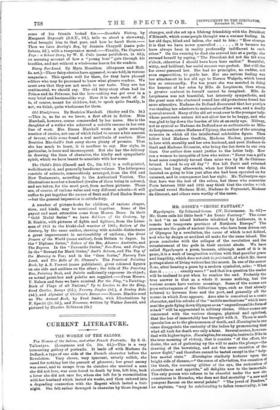CURRENT LITERATURE.
THE WOMEN OF THE SALONS.
Ti.e Women of the Salons, and other French Portraits. By S. G. Tallentyre. (Longmans and Co. 10s. 6d.)—This is a very interesting gallery of portraits. It leads off with Madame du Deffand, a type of one side of the French character before the Revolution. Very clever, very ignorant, utterly selfish, she cared for nothing but the pursuit of pleasure; her great enemy was ennui, and to escape from its clutches she married a man she did not love, was soon bored to death by him, left him, took a lover she did not care for, whom she left for r,a reconciliation with her husband which lasted six weeks, and then entered into a degrading connection with the Regent which lasted a fort- night. She felt rather damaged in character by these frequent
changes, and she set up a lifelong friendship with the Prisident d'Henault, which some people thought was a warmer feeling. In her old days, blind and infirm, she said to him : " How strange
it is that we have never quarrelled it is because we have always been in reality profoundly indifferent to each other." On the evening ho died she arrived late at a party; she excused herself by saying, " The President did not die till nine o'clock, otherwise I should have been here earlier." Beautiful, witty, and brilliant, her social success was perfect. But still the foe ennui pursued her. She had no principles, no rudder, not even superstition, to guide her. Her one serious feeling was her attachment in her old age to Horace Walpole, which bored him so consumedly. For ten years she was assisted in doing the honours of her salon by Mlle. de Lespinasse, than whom a greater contrast to herself cannot be imagined. Mlle. de Lespinasse was not beautiful, but intensely sympathetic, and the great men who clustered round her old protectress found her more attractive. Madame du Deffand discovered that her protegee was stealing her admirers to makes salon of her own, and a deadly quarrel ensued. Many of the old set went over to the younger lady, whose passionate nature did not allow her to be happy, and who was glad to lay down the burden of life at an early age. Midway, not so cynical as Madame du Deffand nor so enthusiastic as Mlle. de Lespinasse, comes Madame d'E pi nay, the author of the amusing memoirs in which all the intellectual celebrities figure. Then follow kind Madame Geoffrin, Madame Necker, passionately in love with morality and her own husband, and next Madame de Steel and Madame Recamier, who bring the list down to our own time. Our author does scant justice to the latter lady. How can a woman be incapable of love who writes : "Never was a girl's head more completely turned than mine was by M. de Chateau- briand. I used to cry all day " ? She left Paris and returned calmer, but long afterwards, when her friend was dying, she insisted on going to him just after she bad been operated on for cataract, and in consequence lost her sight. Mr. Tallentyre says that hers was the last of the salons, but those who remember Paris between 1850 and 1836 may think that the circles which gathered round Madame Mehl, Madame de Peyronnet, Madame de Circourt, and others were worthy of the name.


























































 Previous page
Previous page